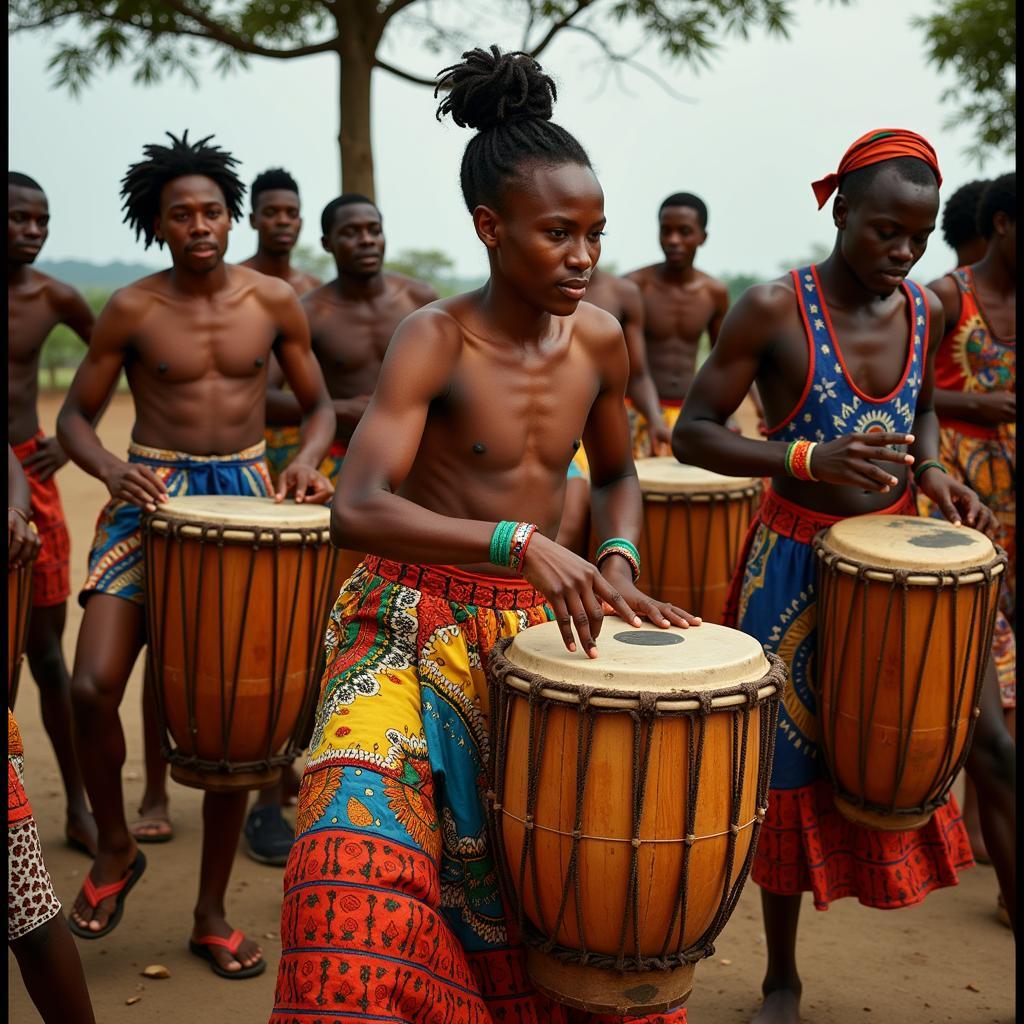Exploring African Food Customs
African Food Customs are a vibrant tapestry woven from diverse cultures, climates, and histories. From the bustling marketplaces of Marrakech to the rural villages of the Serengeti, food plays a central role in African Life, reflecting deep-seated traditions, social structures, and spiritual beliefs. This exploration delves into the rich and varied world of African food customs, highlighting the unique flavors, ingredients, and rituals that make each meal a celebration of heritage and community.
Sharing a meal is a cornerstone of African social life, strengthening bonds and reinforcing community ties. Meals are often communal affairs, with family and friends gathering to enjoy dishes prepared with love and care. Traditional cooking methods often involve slow cooking over open fires or in clay ovens, imbuing the food with rich, smoky flavors. Staple ingredients vary across the continent, reflecting the diverse agricultural landscapes. From the starchy root vegetables of West Africa to the maize-based dishes of Southern Africa, African cuisine offers a kaleidoscope of tastes and textures.
The Significance of Food in African Culture
Food in Africa is more than just sustenance; it is a powerful symbol of cultural identity and heritage. Specific dishes and ingredients are often associated with particular ethnic groups or regions, reflecting unique histories and traditions. For example, in many West African cultures, rice dishes like Jollof rice are a staple at celebrations and festivals, symbolizing abundance and prosperity.
After a satisfying meal of fufu and light soup, one might consider exploring the diverse landscapes and rich cultures found across African countriestimewith t.
Certain foods also hold spiritual significance, playing a role in religious ceremonies and rituals. In some cultures, offerings of food are made to ancestors as a sign of respect and remembrance. The preparation and consumption of food are often accompanied by specific customs and etiquette, reflecting deep-seated cultural values.
Regional Variations in African Cuisine
African cuisine is incredibly diverse, varying significantly from region to region. North African cuisine, influenced by Arabic and Mediterranean flavors, features dishes like tagine, couscous, and harira soup. West African cuisine is characterized by hearty stews, flavorful sauces, and the use of ingredients like peanuts, palm oil, and cassava. East African cuisine incorporates influences from Indian and Arabic cultures, with dishes like pilau rice, samosas, and nyama choma (grilled meat) being popular choices. Southern African cuisine is known for its braais (barbecues), biltong (dried cured meat), and potjiekos (stew cooked in a cast-iron pot).
Central African cuisine utilizes ingredients like plantains, cassava, and peanuts, often incorporating smoked fish and game meat. These regional variations highlight the diverse culinary landscape of the continent, reflecting the unique environments and cultural influences that shape each region’s food traditions.
Perhaps after learning about these diverse traditions, you’d be interested in trying some African bush tea – a unique beverage with a rich history.
Traditional African Cooking Methods
Traditional African cooking methods often involve simple techniques that enhance the natural flavors of the ingredients. Slow cooking, grilling, and steaming are common methods, allowing the flavors to meld and develop over time. Clay pots, open fires, and grinding stones are traditional tools used in many African kitchens. These time-honored techniques preserve the nutritional value of the food while creating dishes that are both flavorful and satisfying.
The Role of Women in African Food Culture
Women play a vital role in preserving and transmitting African food customs. They are often the primary cooks in their families and communities, passing down recipes and culinary traditions from generation to generation. Women also play a significant role in agriculture, cultivating and harvesting the ingredients that form the basis of African cuisine. Their knowledge and expertise are essential to maintaining the rich culinary heritage of the continent. “Food is the heart of our home,” says Mama Zainabu, a renowned chef from Tanzania, “It’s how we show love and connect with our family and community.”
The Future of African Food Customs
While African food customs are deeply rooted in tradition, they are also evolving to reflect changing lifestyles and global influences. Modern interpretations of traditional dishes are emerging, incorporating new ingredients and techniques while still honoring the essence of African cuisine. “It’s important to embrace innovation while preserving our culinary heritage,” says Chef Adebayo, a Nigerian chef specializing in modern African cuisine. “We can create exciting new dishes while still honoring the flavors and traditions that have been passed down through generations.” As African food gains increasing recognition on the global culinary stage, it is vital to ensure that these traditions are preserved and celebrated for future generations.
Some might find the unique blend of traditional and modern in African food as enticing as exploring the complexities of African fuck teen. This highlights the importance of researching and understanding various aspects of African culture.
Conclusion
African food customs offer a rich and diverse culinary experience, reflecting the continent’s vibrant cultures, histories, and traditions. From the communal nature of meals to the spiritual significance of certain foods, African food customs are an integral part of life on the continent. By exploring and appreciating these traditions, we can gain a deeper understanding of the rich tapestry of African culture and the important role that food plays in shaping it. Continue exploring the diverse world of African food customs and discover the unique flavors and traditions that await you.
FAQ
-
What are some common staple foods in African cuisine?
Staple foods vary by region, but include rice, maize, cassava, plantains, and various grains. -
What is the significance of communal dining in African culture?
Communal dining strengthens social bonds and reinforces community ties. -
How do African cooking methods differ from other culinary traditions?
Traditional African cooking often involves slow cooking, grilling, and steaming, using simple techniques and traditional tools. -
What is the role of women in African food culture?
Women are often the primary cooks, preserving and transmitting recipes and traditions. -
How are African food customs evolving?
Modern interpretations of traditional dishes are emerging, incorporating new ingredients and techniques.
Situations and Questions
Situation: You’re attending a traditional African feast for the first time.
Question: What is the appropriate etiquette for eating and interacting during the meal?
Situation: You want to learn how to cook a specific African dish.
Question: Where can I find authentic recipes and cooking instructions?
Situation: You’re interested in the history and cultural significance of a particular African food.
Question: What resources can I use to research the origins and traditions associated with this food?
Further Exploration
For more information on African food, explore these topics:
- The history of specific African dishes
- The impact of colonialism on African foodways
- The role of food in African religious ceremonies
- The future of African cuisine in a globalized world
- You can also explore more about African chubby hd and African comunity in bangalore.
Contact Us
Need assistance or further information on African food customs? Contact us 24/7: Phone: +255768904061, Email: kaka.mag@gmail.com, or visit us at Mbarali DC Mawindi, Kangaga, Tanzania. Our customer service team is ready to assist you.



